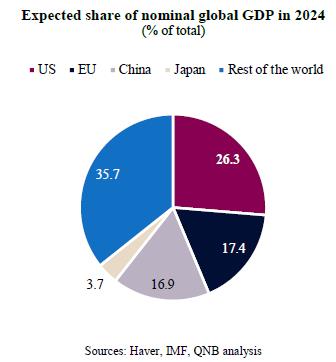
'Harris Presidency Would Bring Some Continuity To Current US Economic Agenda'
DOHA: It is widely recognised that the US economy is not only crucial for long-standing American prosperity but also essential for global stability. Directly or indirectly, the world benefits from America's extensive market infrastructure, deep financial system, and robust regulatory frameworks. With an expected nominal GDP of $28.8 trillion in 2024, out of an aggregate of $109.5 Tn for the global economy, the US operates at a scale that is unmatched by other economic powers.
Hence, it is important to understand the implications of the US election for the global economy, particularly as each of the two main candidates (Donald J. Trump and Kamala Harris) withhold different economic agendas.
This week, we dive into the economic programme of candidate Harris, current US vice president who is trying to become the 47th president of the US and the first female to ever achieve the position.
Harris is currently serving as the 49th vice president of the US, holding the position since 2021 under president Joe Biden. This makes Harris the successor candidate for the incumbent, suggesting a“continuity” agenda that is well known for investors and analysts: with a programme focusing on social justice, equality, sustainability and the industries of the future, it intends to enhace, deepen and update the traditional platform of the Democratic Party. In other words, Harris supports stricter regulation of businesses, more social benefits for workers and the middle class, higher taxes for corporates and high income households, a more open policy to immigrants and a more traditional approach to foreign trade.
In our view, three main points should be highlighted regarding Harris' economic agenda.
First, if elected, Harris tends to enable a more progressive fiscal policy, i.e., a policy that supports income and wealth re-distribution, taxing more the high income households while spending more on the low income households. In fact, Democrats are proposing to raise corporate income taxes to 28% from 21%, a mid-range between the current rate and the higher rates that prevailed before Trump's 2017 tax cuts. This comes in stark contrast to Trump's proposal to further reduce the corporate income tax to 15%. Moreover, individual taxes on those earning more than USD 400,000 per year are also expected to increase in an eventual Harris administration, as Democrats seem unwilling to extend the temporary tax breaks of 2017 to this segment of the population. However, this does not mean that Harris' presidency would enact a fiscal tightening. Part of her platform also includes additional expenses on healthcare, social security, infrastructure, energy transition and subsidies to strategic sectors. Taken together, those fiscal measures could contribute to further expand the fiscal deficit, which is currently running at the critical level of 6.7% of potential GDP. The net effect on growth is likely to be positive, even if potentially more government debt issuance could lead to higher long-dated yields.
Second, Harris seems to be committed to a more stringent approach to regulatory measures, further tightening conditions across various sectors.
Environmental legislation would be a priority, with comprehensive climate policies aimed at reducing emissions through tougher standards for industries and vehicles. Harris would likely further streamline the permitting process for green energy projects while imposing stricter regulations on fossil fuel industries. Anti-trust enforcement would also be more aggressive, potentially involving measures to break up large companies and block anti-competitive behaviour. As a result, while some targeted sectors would benefit, such as renewable energy and electrical vehicles, the net effect would likely add an additional burden on competitiveness.
Third, Harris' stance on immigration may also have significant implications for the country's demographics and labour markets. Harris has consistently supported an immigration reform that belances border security with humane treatment and the provision of a pathway to citizenship for undocumented immigrants that have been living in the country for a long time. This is important as about 4-5% of the US population is comprised of undocumented immigrants. Moreover, this segment is key to supply labour to the service industry and hourly wage contracts, preventing an overtightening of the labour market and offsetting demographic trends. Over the medium term, this contributes to moderate average wage growth and inflation. A more positive demographic profile would also be positive for growth.
All in all, an eventual Harris presidency would bring some continuity to the current US economic agenda, particularly on the fiscal, regulatory and migration spaces. Taken together, the proposed agenda should be a mixed bag for growth, as fiscal and immigration policies would boost activity, whereas tighter regulation would weigh on GDP expansion.

Legal Disclaimer:
MENAFN provides the
information “as is” without warranty of any kind. We do not accept
any responsibility or liability for the accuracy, content, images,
videos, licenses, completeness, legality, or reliability of the information
contained in this article. If you have any complaints or copyright
issues related to this article, kindly contact the provider above.


















Comments
No comment